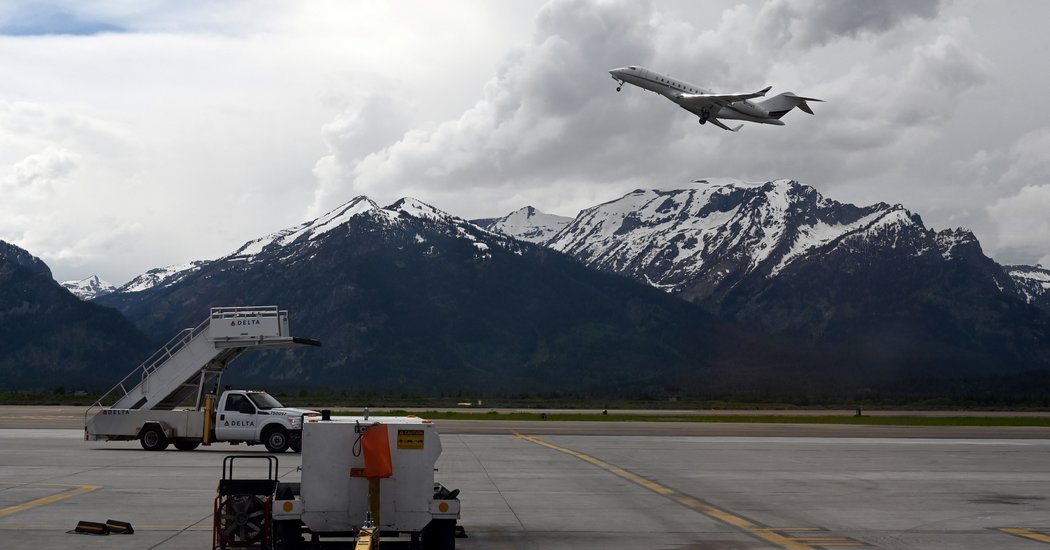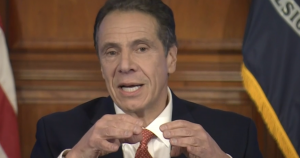A wall of jagged peaks rises nearly 14,000 feet above the valley floor of Grand Teton National Park in Wyoming. Seeing it for the first time can literally be jaw-dropping as you fly into the valley of Jackson Hole, where private jets carrying wealthy passengers fleeing Covid-19 hot spots elsewhere have landed in recent weeks.
Some have brought their own medical equipment — even a ventilator, according to one local doctor — to this remote corner of Wyoming. With its magnificent landscape and extremely favorable state tax policies for the rich, Teton County, home to Jackson Hole, has quietly become the richest county in the United States. Its per capita income is the nation’s highest, at $251,728, nearly $58,000 more than Manhattan, its closest competitor. The county’s 1 percent earned an average of $22.5 million a year in 2015.
Christie Watts, a life coach based in Jackson Hole, said that at the height of the recent influx, “it was difficult to receive” official alerts for residents to stay home “while the airport was crammed with hundreds of people.”
Plane landings have slowed in recent weeks as wealthier arrivals have hunkered down. Yet even a slow trickle of virus interlopers can have an outsize impact on a small rural enclave.
The chasm between the rich and the rest in Teton County is bridged by an uneasy alliance between the wealthy owners of vacation homes and the lower-income residents who depend on them for their livelihoods. The county has the country’s widest disparity in income between the top 1 percent and the bottom 99. Now the pandemic is laying bare the tensions of that relationship as service workers must choose between continuing to do jobs that may expose them to the virus, or risk the loss of wages, health insurance and eviction. All three of the area’s ski resorts shut down about a month early because of the pandemic, and restaurants and the national parks are closed.
“It’s disgraceful to see people not understand the severity of the problems,” one airport worker told me. “It makes it uneasy to provide the services we do to these kinds of people. I live paycheck to paycheck and I don’t have much saved up in my account to handle” a serious illness.
The rural West lures many because it seems like a different world. It is wilderness without the snares and moral traps of the city, populated with mythical people — the bohemian ski bum, the dusty cowboy. This romantic facade is especially appealing to the stressed-out superrich because it connects them to nature and bygone small-town character, as I discovered doing research for a book examining the ways they see themselves and other people — especially their rural neighbors.
Now the small wealthy communities that dot the West and other remote parts of the country have come in handy as places to hide from the pandemic.
But it turns out you can’t outrun the virus.
Teton County has 57 confirmed cases of Covid-19, the highest number in the state after the much more populous Laramie County, with 62. But Teton County far and away leads Wyoming in the rate of cases, with 242.9 per 100,000 people. (An additional three cases were of people who had home addresses outside the county.) As of Tuesday, no one had died in the county, but health officials don’t expect the number of cases in Wyoming to peak until the end of the month.
Spread across 4,216 square miles of mostly wild country, including Grand Teton and Yellowstone National Parks, Teton County is nearly 3½ times the size of Rhode Island. For all that space, only about 23,000 people live there year round. The county’s sole hospital, St. John’s Health, has 24 ventilators and a dwindling supply of personal protective equipment.
Pete Muldoon, the mayor of Jackson, the county seat, says that the extreme wealth of some of the valley’s part-time residents makes it more difficult for local people to stomach job losses from the lockdown, especially when they are wondering if the community’s health care resources “will instead go to someone who might only have a house here to avoid paying taxes.” Despite a great temptation to point fingers at the rich, Mr. Muldoon says, he reminds people that tax policies enable “a small number of people to hoard all of the wealth.”
It is difficult to know how many wealthy people have moved to Teton County to shelter in their mansions. Early on, the county urged outsiders to stay away. In late March, the county’s health officer, Dr. Travis Riddell, was explicit, saying, “Nonresident homeowners are strongly encouraged to leave or not travel to Teton County.”
But a pharmacist reported to local health officials recently that he was processing a lot of prescription transfers from other states for three-month refills. And an employee for a company that provides services for the ultrawealthy (few people were willing to be quoted by name) told me that she estimated there are 30 percent more of those families around than usual at this time of year.
“We’ve done all we can to provide for them, such as grocery shopping and other services,” she told me. “Many came for spring break, went home, and then came right back. I know one family of six from Manhattan that has rented a house until August.”
She said she feared going to work. “I can’t believe everyone is flocking here just to be safe,” she said. “I know you want to get out of New York and California. But I shouldn’t be working, and you shouldn’t be here either.”
One physician told me, “I know a doctor in town who was asked to go to someone’s property once the private ventilator arrived, to make sure it was operational.” Disturbed by this hoarding of medical supplies, this person said, the doctor refused.
At the same time, wealthy year-round residents are stepping up. In only a few weeks’ time, the Community Foundation of Jackson Hole raised $2 million to help local nonprofits. Owners of a brewery, among others, donated $45,000 worth of medical masks to the hospital, emergency medical workers and the county health department. The hospital’s chief executive called them a “godsend.”
“That’s the upside of wealth here,” said one doctor. “These wealthy locals are different from the wealthy people now coming to hide out.”
Other permanent wealthy residents are worried about the toll this will take on the low-income community that props up their way of life. “The worker community that you spoke about in your book are going to be hit hard with no safety net in place,” one told me.
While Western Edens like Teton County provide escapes for the superrich, it often comes at the expense of the rural working class, which is already faced with unaffordable housing, stagnant wages, and overburdened rural health care systems. In this dark hour the pandemic is stripping away the veneer that all is well in Paradise.
Justin Farrell is an associate professor at Yale’s School of Forestry and Environmental Studies and the author of “Billionaire Wilderness: The Ultra-Wealthy and the Remaking of the American West.”
The Times is committed to publishing a diversity of letters to the editor. We’d like to hear what you think about this or any of our articles. Here are some tips. And here’s our email: [email protected].
Follow The New York Times Opinion section on Facebook, Twitter (@NYTopinion) and Instagram.



















